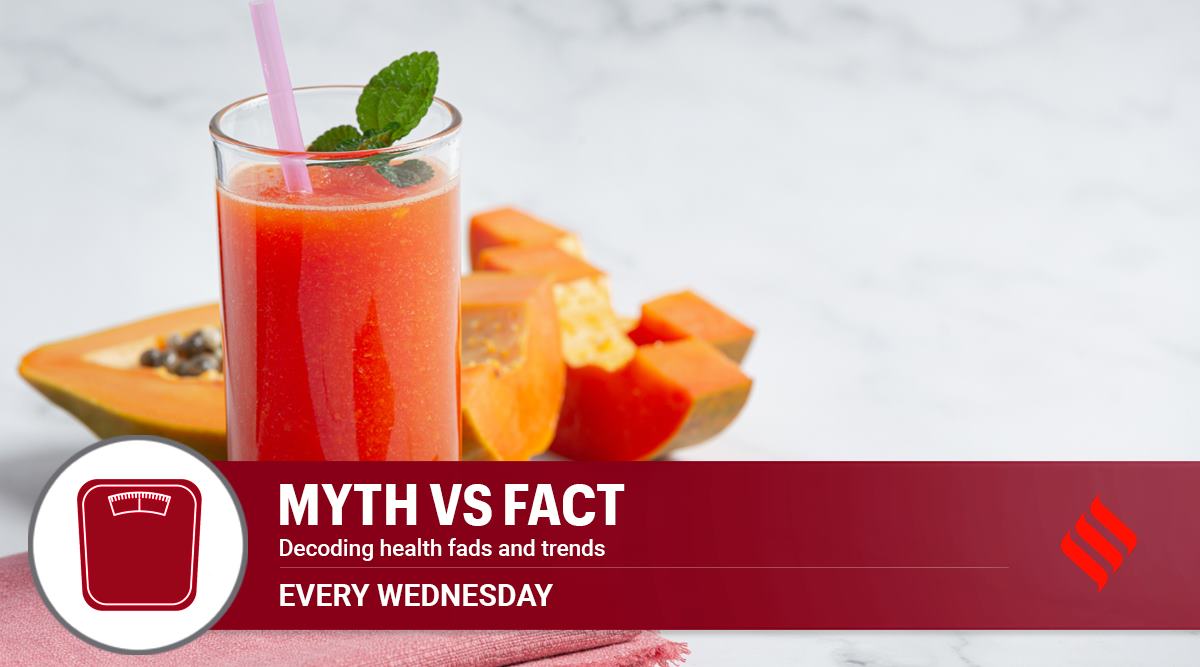Dengue alert: Why papaya juice and giloy cannot help increase platelets
There have been unregulated animal studies that show minor levels of increase in platelets. But the drop in dengue cases can be sudden and massive and the patient may need immediate platelet transfusion in such cases to prevent complications, says Rashi Tantia, HOD, Dietetics, Metro Hospital, Faridabad
 Papaya fruit and its juice are often recommended as a natural remedy to boost platelet counts (Pic source: Freepik)
Papaya fruit and its juice are often recommended as a natural remedy to boost platelet counts (Pic source: Freepik) For long, there has been a belief that consuming papaya juice and giloy (tinospora cordifolia) can significantly increase platelet count in the body, particularly during cases of low platelet count associated with dengue fever or other illnesses. However, this belief is more of a myth than a reality. So why does this claim lack scientific evidence?
What does low platelet count mean?
Platelets are small cell fragments in the blood that play a crucial role in clotting and preventing excessive bleeding. When a person’s platelet count drops below normal levels, it can lead to a condition called thrombocytopenia, characterised by an increased risk of bleeding. It is important to address the underlying cause of thrombocytopenia and provide appropriate medical treatment. A normal platelet count ranges between 1,50,000 and 4,50,000 platelets per microlitre of blood. In dengue fever, the platelet count may drop significantly, sometimes falling below 1,00,000 or even 50,000 platelets per microlitre of blood. The drop in platelet count, if caused by dengue, is temporary and reversible, and lasts till the infection is present in your body. In cases of dengue, patients experience severe symptoms such as high fever, vomiting, nausea, body ache, and skin rash during the first four days. The platelet starts dropping on day three and four, with a significant drop on the fourth, fifth and sixth day. Levels start building up from the seventh day onward once the infection subsides. But if the drop is severe, then a transfusion is a life-saver.
There is no scientific evidence of papaya juice having a significant effect on platelet counts
Papaya fruit and its juice are often recommended as a natural remedy to boost platelet counts. This belief is primarily based on the presence of an enzyme called papain, which is believed to aid in the production of platelets. However, there is a lack of scientific evidence to support this claim. While papaya is a nutritious fruit and can contribute to overall health, there is no direct correlation between consuming papaya juice and increasing platelet count. There are studies showing an increase in platelet counts in animals but this finding has not been validated in human trials yet. Besides, even these studies have been small and not wide-ranging enough and the percentage of increase in platelets has been minimal. The drop in dengue cases can be sudden and severe and the patient may need immediate platelet transfusion in such cases to prevent complications.
Giloy may damage your liver
Also known as Guduchi or Amrita, this is a herb that has been commonly used in traditional Ayurvedic medicine. It is believed to have various health benefits, including boosting immunity and helping in fever management. However, there is limited scientific research to substantiate the claim that giloy can significantly increase platelet counts. The existing studies on giloy mainly focus on its immunomodulatory properties and its potential in treating certain diseases. Therefore, relying on giloy to increase platelet count may not yield the desired results. A 2021 review, published in BMC Complementary Medicine and Therapies, had clearly established how unprescribed use of giloy had actually damaged the liver in patients, many of whom recovered the moment they discontinued their supplements. According to that review, “Initial patient complaints from herbal hepatotoxicity have ranged from asymptomatic liver function test abnormalities to acute liver failure requiring transplant and/or resulting in death. Our report of three patients with probable Ayurvedic Medicine-induced liver injury highlights the pervasive challenges of evaluating causality in herbal-medication induced liver injury. One patient took the supplement Giloy Kwath (water extraction (decoction) of herb(s)), which contained only Tinospora cordifolia. This herb was also present in an AM, Manjishthadi Kwatham, taken by another patient in this report. Tinospora cordifolia was an ingredient found in eight different formulations of Ayurvedic Medication associated with severe liver injury. For a supplement with a single herb ingredient and a uniform pattern of liver injury across multiple occurrences, such as the recent case series involving Withania somnifera (also known as Ashwagandha) [18], assignment of causality can be determined with greater certainty.”
What should you actually do when your platelets dip?
It’s important to note that thrombocytopenia can have various underlying causes, such as viral infections, autoimmune disorders, medications or other medical conditions. Treating the root cause and following the prescribed medical interventions are crucial for managing and improving platelet counts. In cases of severe thrombocytopenia or situations where platelet count drops critically low, medical interventions like platelet transfusion may be necessary. These interventions should only be administered by qualified healthcare professionals after a thorough diagnosis and evaluation of the patient’s condition.
Relying solely on natural remedies without medical guidance can be ineffective and potentially risky as the delay robs you of medically guided attention.
- 01
- 02
- 03
- 04
- 05






























